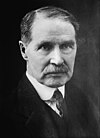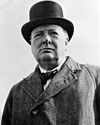Richard Law, 1st Baron Coleraine
The Lord Coleraine | |
|---|---|
 | |
| Minister of Education | |
| In office 24 May 1945 – 26 July 1945 | |
| Preceded by | Rab Butler |
| Succeeded by | Ellen Wilkinson |
| Member of Parliament for Haltemprice | |
| In office 24 February 1950 – 12 February 1954 | |
| Preceded by | New constituency |
| Succeeded by | Patrick Wall |
| Member of Parliament for Kingston upon Hull South West | |
| In office 28 October 1931 – 26 July 1945 | |
| Preceded by | John Arnott |
| Succeeded by | Sydney Smith |
| Personal details | |
| Born | Richard Kidston Law 27 February 1901 |
| Died | 15 November 1980 (aged 79) |
| Nationality | British |
| Political party | Conservative |
| Spouse(s) | Mary Virginia Nellis (m. 1929; died 1978) |
| Children | 2 |
| Parents | Bonar Law Annie Robley Law |
| Education | Shrewsbury School |
| Alma mater | St John's College, Oxford |
| Occupation | Politician |
Richard Kidston Law, 1st Baron Coleraine, PC (27 February 1901 – 15 November 1980) was a British Conservative politician.
Early life[edit]
He was the youngest son of six children born to the former Conservative Prime Minister of the United Kingdom Bonar Law by his wife, the former Annie Pitcairn Robley (a daughter of Harrington Robley, a merchant from Glasgow). His brother Charlie, a lieutenant in the King's Own Scottish Borderers, was killed at the Second Battle of Gaza in April 1917,[1] followed by brother James, a captain in the Royal Fusiliers, who was shot down and killed on 21 September 1917.[2] His sister Isabel married Sir Frederick Sykes,[3] and another sister Catherine married The 1st Baron Archibald in 1961.[4]
He was educated at Shrewsbury School and St John's College, Oxford.[5]
Political career[edit]
Law was elected as Member of Parliament (MP) for Kingston upon Hull South West in the general election of 1931 and held the seat until 1945. In 1940 he was appointed Financial Secretary to the War Office. He was then transferred to the post of Parliamentary Under-Secretary of State for Foreign Affairs until 1943. While in the latter post he took part in the Bermuda Conference on the fate of European Jewry[6] and was sworn of the Privy Council in the 1943 New Year Honours.[7]
He was then Minister of State, also at the Foreign Office, until 1945, when he served briefly as Minister of Education in Churchill's caretaker government. In a by-election in November 1945 he became MP for Kensington South, which he held until February 1950.[8]
Law was again elected as an MP in the election of 1951, this time for Haltemprice, but he resigned this seat in January 1954 and in February was elevated to the House of Lords as Baron Coleraine of Haltemprice in the East Riding of the County of York.[9] After his elevation to the peerage, he went on a two week lecture tour in the United States,[10] following two weeks in Russia at the invitation of the Russian government.[11]
Published works[edit]
In 1950, Law published Return from Utopia, a book in which he stated his belief that trying to use the power of the state to create any sort of Utopia is not just unattainable but positively evil, because one of the first principles to be sacrificed is the principle of freedom and individual choice. Law argued:
To turn our backs on Utopia, to see it for the sham and the delusion that it is, is the beginning of hope. It is to hold out once again the prospect of a society in which man is free to be good because he is free to choose. Freedom is the first condition of human virtue and Utopia is incompatible with freedom. Come back from Utopia and hope is born again.[12]
In 1970, Lord Coleraine published another book, For Conservatives Only, in which he criticised the Conservative leadership of the time for, in his view, sacrificing Tory principles for electoral expediency and the pursuit of the "middle ground". At this time he was Patron of the Selsdon Group of Conservative MPs.
Personal life[edit]
On 26 January 1929, Lord Coleraine (when still Richard Law) had married Mary Virginia Nellis, the second daughter of Abraham Fox Nellis, of Rochester, New York.[13] Her father, a silk manufacturer, had died in 1923.[14] Together, they were the parents of two children, including:[15]
- James Law, 2nd Baron Coleraine (b. 1931), who married Emma Elizabeth Richards, only daughter of Nigel Richards, in 1958. After their divorce in 1966, he married Anne Patricia Farrant in 1966. She was the second daughter of Maj.-Gen. Ralph Henry Farrant.[15]
- Hon. Andrew Bonar Law (b. 1933), who married Joanna Margarette Neill, daughter of Raymond Neill of Ireland, in 1961.[16][17]
Lady Coleraine died on 3 April 1978 in Helensburgh, Scotland. Lord Coleraine died on 15 November 1980, age 79, and was succeeded in the barony by his son James Martin Bonar Law.[15]
Descendants[edit]
Through his elder son James, he was a grandfather of Hon. Elizabeth Mary Law (b. 1961), who married Charles Ironside, 3rd Baron Ironside (only son and heir of Edmund Ironside, 2nd Baron Ironside) in 1985; Hon. Sophia Anne Law (b. 1964); Hon. James Peter Bonar Law (b. 1975), Hon. Henrietta Margaret Law (1968–1993), and Hon. Juliana Caroline Matilda Law (b. 1971).[15]
Through his son Andrew, he was a grandfather of Richard Pitcairn Bonar Law (b. 1963) and Charlotte Mary de Montmorency Law (b. 1964)
References[edit]
- ^ Taylor (2007) p. 11
- ^ Taylor (2007) p.12
- ^ "A new book examines Rupert Murdoch's father and his media dynasty". The Independent. 20 October 2015. Retrieved 28 May 2020.
- ^ Adams (1999) p. 293
- ^ "Richard Kidston Law, 1st Baron Coleraine". The Peerage. Retrieved 8 January 2017.
- ^ David Blair, "The Bermuda Conference that Failed to Save the Jews," The Daily Telegraph (London), Saturday 31 January 2015.
- ^ "No. 35841". The London Gazette. 29 December 1942. p. 1.
- ^ "Mr Richard Law". api.parliament.uk. Hansard. Retrieved 28 May 2020.
- ^ "No. 40103". The London Gazette. 16 February 1954. p. 1008.
- ^ "Lord Coleraine Here for Tour". The New York Times. 5 November 1954. Retrieved 28 May 2020.
- ^ "FEAR HELD FACTOR IN SOVIET ATTITUDE; Lord Coleraine, Reporting on Trip, Says It Is Basis for Fight on Bonn Army". The New York Times. 6 November 1954. Retrieved 28 May 2020.
- ^ Richard Law, Return from Utopia (London: Faber & Faber, 1950), p. 9.
- ^ TIMES, Special Cable to THE NEW YORK (31 December 1928). "R.K. LAW IS ENGAGED.; Son of One-Time Prime Minister to Wed Mary Nellis of Rochester". The New York Times. Retrieved 28 May 2020.
- ^ "THREE MANUFACTURERS DIE; Rochester Loses G. W. Wetmore, J. W. Starandt and A. F. Nellls". The New York Times. 11 June 1923. Retrieved 28 May 2020.
- ^ a b c d "Coleraine, Baron (UK, 1954)". www.cracroftspeerage.co.uk. Heraldic Media Limited. Retrieved 28 May 2020.
- ^ Clear, Caitriona (2015). Women's Voices in Ireland: Women's Magazines in the 1950s and 60s. Bloomsbury Publishing. p. 11. ISBN 978-1-4742-3669-0. Retrieved 28 May 2020.
- ^ "Wedding Hon Andrew Bonarlaw Miss Joanna Margarette Editorial Stock Photo". www.shutterstock.com. Shutterstock Editorial. Retrieved 28 May 2020.
External links[edit]
- Hansard 1803–2005: contributions in Parliament by William Davison
- Newspaper clippings about Richard Law, 1st Baron Coleraine in the 20th Century Press Archives of the ZBW
| Parliament of the United Kingdom | ||
|---|---|---|
| Preceded by John Arnott | Member of Parliament for Kingston upon Hull South West 1931–1945 | Succeeded by Sydney Herbert Smith |
| Preceded by Sir William Davison | Member of Parliament for Kensington South 1945–1950 | Succeeded by Sir Patrick Spens |
| New constituency | Member of Parliament for Haltemprice 1950–1954 | Succeeded by Sir Patrick Wall |
| Political offices | ||
| Preceded by Edward Grigg | Financial Secretary to the War Office 1940–1941 | Succeeded by Duncan Sandys |
| Preceded by Rab Butler | Parliamentary Under-Secretary of State for Foreign Affairs 1941–1943 | Succeeded by George Hall |
| Preceded by Unknown | Minister of State for Foreign Affairs 1943–1945 | Succeeded by William Mabane |
| Preceded by Rab Butler | Minister of Education 1945 | Succeeded by Ellen Wilkinson |
| Peerage of the United Kingdom | ||
| New creation | Baron Coleraine 1954–1980 | Succeeded by James Martin Bonar Law |
- 1901 births
- 1980 deaths
- Alumni of St John's College, Oxford
- British Secretaries of State for Education
- Children of Prime Ministers of the United Kingdom
- Conservative Party (UK) MPs for English constituencies
- Members of the Privy Council of the United Kingdom
- Ministers in the Churchill caretaker government, 1945
- Ministers in the Churchill wartime government, 1940–1945
- Participants in the Norway Debate
- Peers created by Elizabeth II
- People educated at Shrewsbury School
- UK MPs 1931–1935
- UK MPs 1935–1945
- UK MPs 1945–1950
- UK MPs 1950–1951
- UK MPs 1951–1955
- UK MPs who were granted peerages
- War Office personnel in World War II



No comments:
Post a Comment